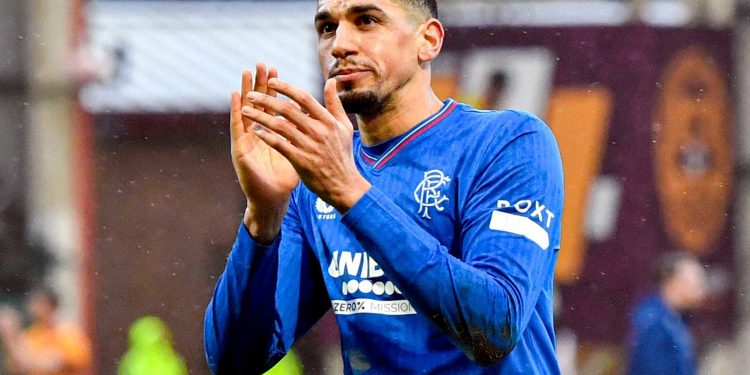The Case for and Against His Rangers Future
When Leon Balogun initially joined Rangers for his first spell on a free transfer in 2021, few could have predicted he would still be a fixture in the starting XI—let alone a vital presence in Old Firm clashes—by the midpoint of 2025. Yet here we are.
In today’s 1-1 draw with Celtic at Ibrox, Balogun returned from a broken cheekbone—donning a protective face mask—and partnered Scotland international John Souttar at the heart of Barry Ferguson’s defence. He delivered a commanding performance, helping to steady a backline that has been alarmingly porous in recent months.
A Defensive Rock in the Old Firm
Up against a Celtic side that had scored five in each of their previous three matches, Balogun was the standout in a much-improved Rangers defence. He limited the Scottish Premiership champions to just a handful of chances and a solitary goal, expertly marshalling the in-form attacking duo of Daizen Maeda and Adam Idah.
Although his lack of pace was occasionally exposed—particularly by the explosive Maeda—Balogun compensated with sharp positioning, composure, and his wealth of experience, leading by example throughout the contest.
Is There Still a Place for Balogun?
As Rangers enter a new era—marked by fresh ownership, an evolving football structure, and a new manager—a complete squad overhaul is unlikely to be achieved in a single window. Which raises a key question: is there still a place for the soon-to-be 37-year-old Nigerian centre-back?
The Case in Favour
Balogun was initially released by the club in 2022 as Rangers sought to lower the squad’s average age. However, the shortcomings of that strategy quickly became evident. Just a year later, he was re-signed to bring back the experience and leadership that had been lost. Now, three years on, the club has yet to identify a clear upgrade on the former Brighton defender—despite a steady influx of centre-backs during that period.
John Souttar, Ben Davies, Neraysho Kasanwirjo, Robin Pröpper, and the elusive Rafael Fernandes have all arrived at Ibrox since Balogun’s initial departure, yet none have firmly established themselves as more dependable alternatives. Whether through injuries, inconsistency, or an inability to cope with the physical demands of the Scottish game, each has come up short. As a result, heading into the summer of 2025, Balogun remains Rangers’ most reliable option at the heart of the defence.
Undeniable Influence in Big Games
He was ever-present during Rangers’ best run of form in an otherwise forgettable campaign, anchoring the backline during the strong pre-Christmas period. His early injury in the away defeat to St. Mirren marked the beginning of the team’s second-half slump—highlighting his influence not just in moments of strength, but in his absence as well.
Balogun has also consistently been trusted to start the club’s biggest European fixtures, lining up against the likes of Manchester United, Tottenham Hotspur, and Athletic Bilbao—further proof of just how vital he remains to the squad.
A Leader On and Off the Pitch
His leadership off the pitch is just as valuable. A seasoned presence in the dressing room, Balogun has won every domestic honour in Scotland—an achievement most of the current squad can only aspire to. With significant turnover expected in the defensive unit this summer, a calm, experienced figure who knows what it takes to get over the line could be crucial.
But the question remains: should that still be Balogun?
The Case Against
As much as Balogun’s leadership and reliability have been clear assets, there’s no avoiding the reality of age. He turns 37 later this year, and while his game intelligence allows him to offset his declining pace, the physical demands of the Scottish Premiership—combined with the added burden of European competition, with Rangers set to enter the Champions League qualifiers in July—could soon prove too much.
Injuries have become increasingly frequent, and although he’s shown commendable resilience in returning to action, the pattern is becoming difficult to ignore. Relying on a veteran with a growing injury record to anchor the defence through another gruelling campaign is a calculated risk—one that may not be sustainable.
Succession Planning Must Begin
There’s also a wider issue of succession planning. Continued reliance on Balogun could stall the development of younger centre-backs—whether from within the club’s academy or new recruits—who require minutes and responsibility to grow into long-term solutions. If Rangers are serious about building a modern, progressive structure under new leadership, they must avoid repeating past mistakes.
Indeed, that very hesitation has cost the club before. Connor Goldson and James Tavernier—once pillars of the side—have seen their reputations fade among the support, not because of lack of service, but because they were allowed to stay beyond their prime. Rangers can’t afford another such oversight.
Nostalgia and loyalty have their place, but sentimentality rarely pays off in modern football. At some point, every club must make hard decisions. And for Balogun, that time may be approaching.
Replacement Options
If Rangers decide to move on from Leon Balogun, there are several experienced defenders who could step in and offer the leadership and stability needed at the heart of the defence.
Jan Vertonghen, still active with Anderlecht, brings a similar skill set, along with a history of winning titles in Belgium and Portugal. At 37, he may be in the twilight of his career, but his tactical awareness and ability to organise a defence would provide short-term reliability, but it remains to be seen if Rangers under their new ownership would have the funds required to prize him to Scotland.
Alternatively, interim boss Barry Ferguson has hinted at the need for more players who ‘get it’ and if Rangers are looking to explore Scottish options for experienced defenders, a few domestic names could provide a solid solution.
Las Palmas defender Scott McKenna could be an interesting choice. The 28-year-old Scottish international failed to establish himself in the Premier League with Nottingham Forest but had a solid stint at Aberdeen, where he was a standout performer.
Known for his physicality and strong aerial presence, McKenna would add depth and experience to the Rangers defence, while also being familiar with the demands of Scottish football but could be seen as too similar to John Souttar who made the PFA Scotland Team of the Year this campaign.
Another potential option is Liam Cooper. The 33-year-old former captain of Leeds United enjoyed a solid career in the Premier League before heading to Bulgarian side CSKA Sofia last year.
Though he has primarily played in England, Cooper has international experience with Scotland and is known for his leadership and resilience at the back. His Premier League experience would be valuable in a high-pressure situation, and a move to Scotland could be a sensible next step, especially with his leadership qualities.
A Delicate Decision Ahead
In the end, the decision surrounding Leon Balogun’s future at Rangers is a complex one. On one hand, his experience, leadership, and ability to perform in key moments—such as in Old Firm matches like today’s and European fixtures—make him an asset to the squad, especially in a time of transition at Ibrox.
His role in stabilising the defence amid recent struggles is undeniable. However, with age starting to catch up and the need for long-term planning becoming more pressing, Rangers must consider whether it’s time to invest in younger, more dynamic options to build a sustainable future.
While Balogun remains a key figure in the short term, Rangers must balance sentiment with strategy, ensuring they don’t repeat past mistakes of holding on too long to ageing players at the peak of their careers. In a rapidly evolving football landscape, it’s essential that the club strikes the right balance between experience and progression.





